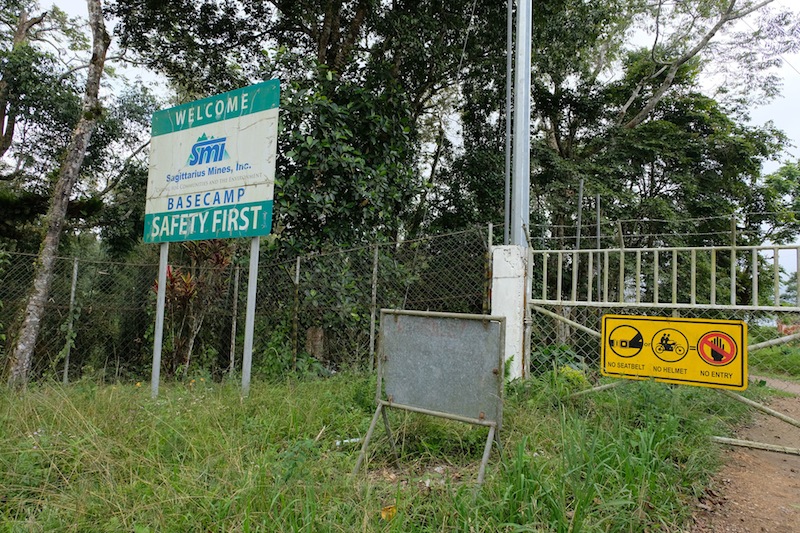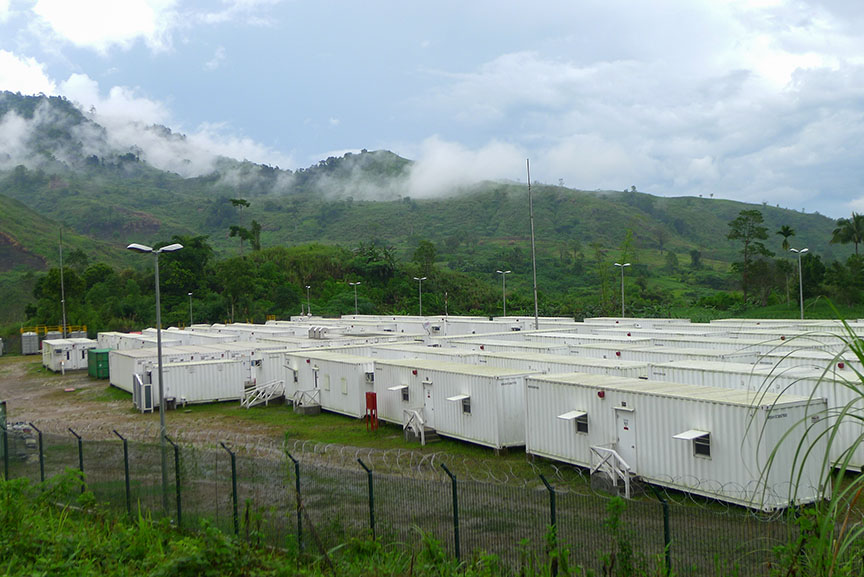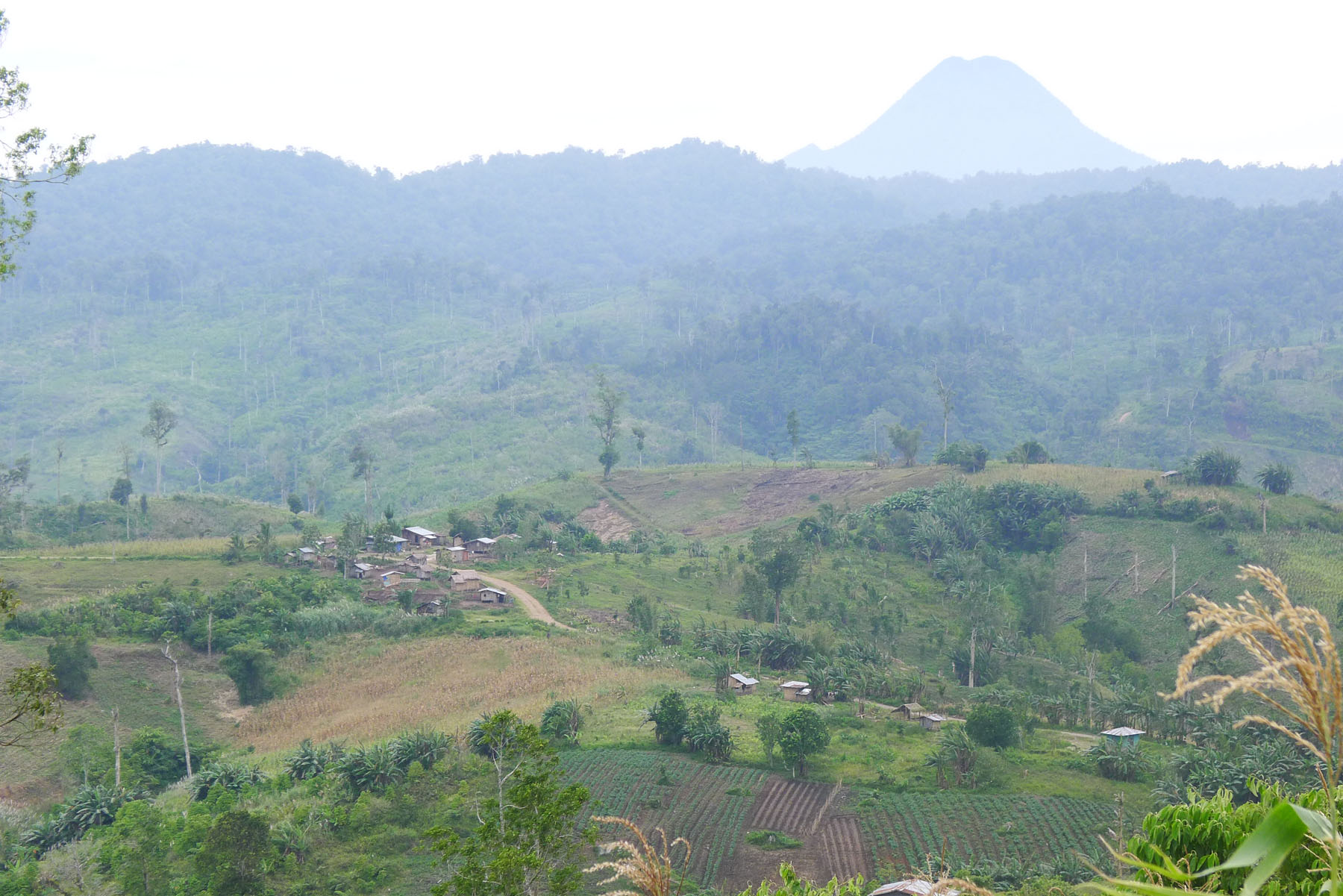 Gateway to base camp of Sagittarius Mines, Inc. in Tampakan, South Cotabato. MindaNews photo by BONG SARMIENTO
Gateway to base camp of Sagittarius Mines, Inc. in Tampakan, South Cotabato. MindaNews photo by BONG SARMIENTO
KORONADAL CITY (MindaNews / 16 April) — The local Catholic Church hosting Southeast Asia’s largest known undeveloped copper and gold minefield is saddened by the directive of President Rodrigo Duterte lifting the almost decades-old moratorium on mineral agreements in the country, a priest said Friday.
Fr. Jerome Millan, Social Action Center director of the Diocese of Marbel, expressed apprehensions that Duterte’s Executive Order 130 could pave the way for Sagittarius Mines, Inc. (SMI) to proceed with its mammoth $5.9 billion Tampakan project.
“(The order of President Duterte to lift the moratorium on new mineral agreements) is a very sad development for us who are working to stop the Tampakan project,” he told MindaNews on the phone.
EO 130, signed on April 14 but was made public the next day, lifted Section 4 of EO 79, which prohibits the granting of mineral agreements until a new legislation rationalizing existing revenue sharing schemes and mechanisms shall have taken effect. Former President Benigno Aquino III issued EO 79 in 2012.
In lifting the prohibition, Duterte noted that Republic Act 10963 or the Tax Reform for Acceleration and Inclusion Act has doubled the rate of excise tax on minerals, mineral products and quarry resources from two percent to four percent.
 Sagittarius Mines, Inc. camp site in Tampakan. MindaNews file photo by BONG S. SARMIENTO
Sagittarius Mines, Inc. camp site in Tampakan. MindaNews file photo by BONG S. SARMIENTO
“The government may (now) enter into new mineral agreements, subject to compliance with the Philippine Mining Act of 1995 and other applicable laws, rules and regulations,” the new EO 130 stated.
The Department of Environment and Natural Resources (DENR) may continue to grant and issue exploration permits under the existing laws, it added.
EO 130 also stated: “The DENR shall likewise undertake a review of existing mining contracts and agreements for possible renegotiation of the terms and conditions of the same, which shall in all cases be mutually acceptable to the government and the mining contractor.”
SMI executives did not return requests for comments on the new executive order.
Late last year, the Diocese of Marbel and environmental groups revived the Tampakan Forum, which was inactive for almost a decade, to intensify the opposition to the controversial Tampakan project “as things have been going in favor of SMI.”
Organizers cited the extension of the firm’s Financial and Technical Assistance Agreement (FTAA) and the restoration of its Environment Compliance Certificate (ECC).
MindaNews broke the stories on major developments in the Tampakan project in January and July last year. In January, it reported that SMI’s FTAA was extended for 12 years and in July, that the Office of the President restored SMI’s ECC, which then Environment Secretary Gina Lopez ordered cancelled in 2017. Lopez passed away in August 2019.
Set to expire on March 21, 2020, the 25-year FTAA awarded to the Tampakan Project, was extended for 12 years – or until March 21, 2032 — in an order issued June 8, 2016 but known only in January 2020, during an interview with Felizardo Gacad, Jr., Mines and Geosciences Bureau- Region 12 director.
In July 2020, Omar Saikol, Environmental Management Bureau – Region 12 director, said SMI’s ECC “was reinstated by the Office of the President on May 6, 2019.”
In September 2020, the National Commission on Indigenous Peoples granted SMI the Certification Precondition (CP). CP is a certification that indigenous cultural communities have given their consent to the mining venture within their ancestral domain and that the Free, Prior and Informed Consent (FPIC) process has been satisfactorily complied with by the company.
However, the ban on open-pit mining, which was approved by the South Cotabato provincial government in 2010, hampered the development of the Tampakan project.
Pro-mining groups have sought the lifting of the ban on open-pit mining, the method the company said is the most viable way to extract the massive deposits because they are just near the surface of the earth.
 The controversial Tampakan project MindaNews photo by BONG S. SARMIENTO
The controversial Tampakan project MindaNews photo by BONG S. SARMIENTO
SMI also asserted that the open-pit mining method does not contravene Republic Act 7942 or the Philippine Mining Act of 1995.
The Tampakan project has the potential of yielding per annum an average of 375,000 tons of copper and 360,000 ounces of gold in concentrate within the 17-year-life of the mine.
If developed, the Tampakan project “has the potential to make a significant contribution to the economic prosperity of the Philippines and enable a better future for the people of southern Mindanao,” SMI said on its website.
Marbel Bishop Cerilo Casicas, who vowed to sustain the opposition against the Tampakan project on concerns over the environment, food security and human rights in the affected communities, urged the provincial government to keep the ban on open-pit mining.
“To us, this provision aligns with the Laudato Si, the second encyclical of Pope Francis on caring for our common home,” the prelate said in a letter to the Sangguniang Panlalawigan on April 8, which MindaNews obtained Friday.
“The whole diocese – priests and the 29 parishes, together with the faithful lay and followers – continue to trust that you are on the side of the environment and the people of South Cotabato,” Casicas said.
The diocese covers South Cotabato and Sarangani, parts of Sultan Kudarat province and the cities of Koronadal and General Santos. (Bong S. Sarmiento / MindaNews)
